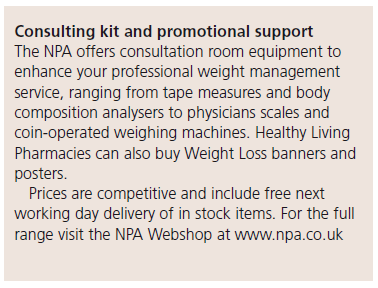Providing routine clinical evidence documenting efficacy in pharmacy under real life conditions
There is probably no current medical discipline more in need of evidence of efficacy than the field of weight loss, especially when the patients are obese and/or with co-morbidities. There is now overwhelming experience with total food replacement programmes (VLCD) , nutrient complete formula diets that are essentially low fat, very low calorie enteral feeds. Over the past four decades, these have gained recognition and acceptance as safe and effective where they are supervised by healthcare professionals, people who are medically experienced so that they can restrict access to the diets or modify treatments when necessary. Real weight loss, beyond simply depleting stored glycogen and water, has physiological implications and the real weight losses due to VLCD programmes, such as Lipotrim, are rapid and substantial. These programmes, run by trained pharmacists and GPs, compete with bariatric surgery in the magnitude of the losses routinely achieved, but without the negatives of substantial costs, higher risks and post weight loss addiction transfer,
EVIDENCE BASE
While a total food replacement formula diet can obviously not be blind to the dieter and a placebo would be unsafe, an innovative patient tracker system introduced into the Lipotrim pharmacy weight loss programme, allows for on demand, virtually instant, assessment of the secure data kept by the pharmacists offering the service. Statistical evidence can be provided for an individual patient or all the patients from a particular medical practice. Evidence can be provided for a single pharmacy or a pharmacy group or, as required, any selected collection of pharmacies, If necessary evidence can be provided from all the pharmacies in an area, as was recently reported for 150 pharmacies in Northern and Southern Ireland by pharmacist Brendan Feeney.
The flexibility of the tracker is such that statistics can be obtained, for example, within a defined BMI range, such as above BMI 40 or perhaps between BMI 25 and 30, or a defined age range or by gender. It can compare the first dieting period with that of subsequent dieting intervals. It can provide statistics on long term weight maintenance after dieting and the stability of the weight during transition from dieting to maintenance.
Critically, it is possible to quantify the dieting successes of people with concurrent medical issues – diabetes, high blood pressure, hypothyroid, depressive illness or any medical condition where weight loss will have an impact on the condition or treatment protocols. The Ireland assessment, previously referred to, provided statistics of the magnitude of the weight losses, the percent of initial weight lost and BMI changes for a cohort of type 2 diabetes patients – all of whom stopped oral diabetes medications prior to dieting, and remained in remission long after the documented weight loss.
Pharmacist Fin McCaul of Prestwich pharmacy and chairman of the Independent Pharmacy Federation, recently presented data to a National Obesity Forum Conference based on a successful cohort with an initial BMI in excess of 40. At Prestwich 1148 patients with a median BMI of 33.6 kg/m2 used the Lipotrim weight management service. 25% were morbidly obese with a BMI > 40 kg/m2. At the time of audit, during which many patients were still dieting, the median BMI had decreased to < 30 kg/m2. 94% of the dieters lost more than 5% of their pre-diet weight, 47% lost more than 10% and 21% of the patients lost more than 20%. Importantly, all patients with type 2 diabetes had their medication stopped by their GP.
Providing clinical evidence of efficacy under real life conditions, is now routine for pharmacists offering the Lipotrim weight loss service and documenting results with the Patient Tracker software.
PDF Version: 28_Lipotrim_advertorial_v1


